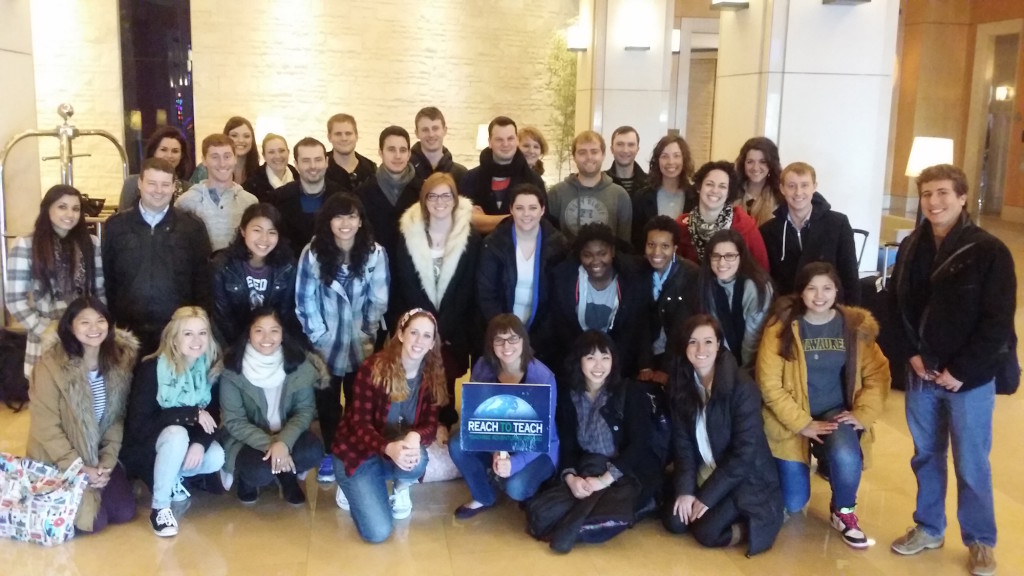4 Rookie Teaching Mistakes To Watch Out For With EPIK

Teaching is hard work. We all know it, but typically no one likes to admit they’re having a hard time until they’re through the crisis. Let us help you identify some simple and common rookie teaching mistakes that won’t take much time to correct in your school once you’re there!
Having worked with many teachers over the past decade with Reach To Teach, I can honestly say that a common comment that makes it’s way back to me, whether it’s directly from teachers we’ve worked with or through the grapevine, is that teaching abroad is MUCH harder than expected.
The staff here at Reach To Teach do our best to prepare our teachers for what to expect from their first weeks and months in a new country, but no one can really convey how hard it is to teach at a new school in a new country and have new colleagues and new students without a background or some experience in teaching. It’s even hard for experienced teachers!
Your TEFL course will help, but it will not teach you the basics of what to expect because we’re all different and we all handle challenges in our own way.
Your recruiter can (and we always do!) outline what to expect with specific teaching programs and schools, but it’s up to the teacher to decide what they’re going to listen to and employ in their classroom. Often enough, important information is ignored in favor of something else that is happening at the time or they miss the class info amidst the many pre-departure conversations that we have with teachers before they depart for their new home abroad.
Here are some simple rookie teaching mistakes that we’ve encountered with our teachers, by their own admission, that we’d like to reiterate for new teachers arriving to teach with EPIK in South Korea.
Rookie Teaching Mistakes – Teaching Expectations
Many teachers arrive abroad with unchecked ambition and a desire to make a difference in a culture that is entirely different to their own. With EPIK specifically, even though teachers are aware that they won’t be lead teachers, they still have misconceptions over what their role will be in class. They know they are co-teachers, but a great number of teachers firmly believe they will be leading their class with their co-teacher providing secondary assistance.
This is a common misconception when you think about the Korean government recruiting qualified teachers from all over the world to teach English to public school students.
Teachers also believe there will be a smooth transition into their teaching job. Over all, we’ve heard teachers say over and over again that it’s wrong to assume anything when you move abroad. Everything is different and nothing will be as you expected.
Too many unchecked ambitions and assumptions are a rookie mistake. Try to go with the flow and be open and adaptable to your new job. It’s a challenge for everyone. You’re not alone in how you are feeling.
Rookie Teaching Mistakes – Lesson Planning
Teacher Willyn says: “When I started at my school, I thought my co-teachers and I would take the time to lesson plan together. I thought we would share ideas and teach together effortlessly.”
Often, expectations with teachers do not match reality. It’s important to listen to your co-teachers and let them take the lead since they have the experience in Korean schools.
It’s common to ask questions, but asking too many questions when you first start a new job can create endless awkward moments between Korean teachers and foreign teachers.
If your Korean co-teacher asks you to do something, it’s best to do it until you’ve been in your job for a few months and have a better idea of how you’re going to be working in the class.
In Korea, teachers demonstrate teaching through action. Do what is assigned first. Once you have gotten to know your colleagues and you have a better understanding of their teaching style and language abilities, then you can move into creating some new ideas for you to use together.
Rookie Teaching Mistakes – Never Asking for Feedback
It’s very rare for schools to offer feedback to new teachers unless you ask for it. Asking for feedback is a foreign concept in Asia in general, and this is often compounded by the fact that teachers don’t think to ask how they can improve in the classroom.
Asking for feedback is valuable to all of us in so many ways. It helps us improve our teaching and makes life easier for us in the classroom. Don’t be afraid to ask your colleagues for help or for tips on improvement.
The concept of constructive criticism in Asia is murky. This is a topic I discuss with all new teachers because it’s an important one. We’re used to receiving constructive criticism in western cultures.
Constructive criticism occurs when feedback is given to improve the quality of something by providing specific and helpful information to create positive change. Constructive criticism differs from other kinds of criticism in that it focuses on specific issues and ways to improve. It is almost always offered with tips on what you need to improve upon softened by feedback or praise for what you are doing right.
In Asia, it’s hard to get people to be honest or say anything that can be construed as negative. Sometimes they’ll dance around your questions and say things like, , “I don’t know. I know it’s tough.”
And sometimes they’re brutally honest to the point where you think you haven’t done anything right!
If this is the case, don’t be afraid to ask if there are things you’re doing well! This could also be a teaching moment for you, as criticism is often seen as just criticism in Asia.
By talking about how constructive criticism is offered in your country, you’re paving the way for yourself for the rest of the school year and also paving the way for new teachers who will be in your position years from now. Cultural exchange is good!
Rookie Teaching Mistakes – Never Leaving School
It’s incredibly easy to achieve burnout in a few months with teaching. Teachers want to leave a good impression with their school and it’s your first job, so it’s natural to want to do your best work. This often leads to staying late at school and it quickly turns into a routine. This leads to burnout.
There is no need to reinvent the wheel when you’re preparing your lesson plans and activities. Talk to your teaching colleagues. Find out what works first and then tweak your lessons to try new things. Above all, focus on efficiency. If something doesn’t work in your class, make sure you jot it down after class so you can refer back to your notes the next time you teach a particular lesson.
Remember that you have a life outside of school and part of the reason you moved abroad was to learn more about your new home country and be an active participant in life there. Life IS what you make it! Enjoy your time abroad!
Do you have any tips or mistakes that you think other ESL teachers should know about? We’d love to hear from you. Drop us a line!







